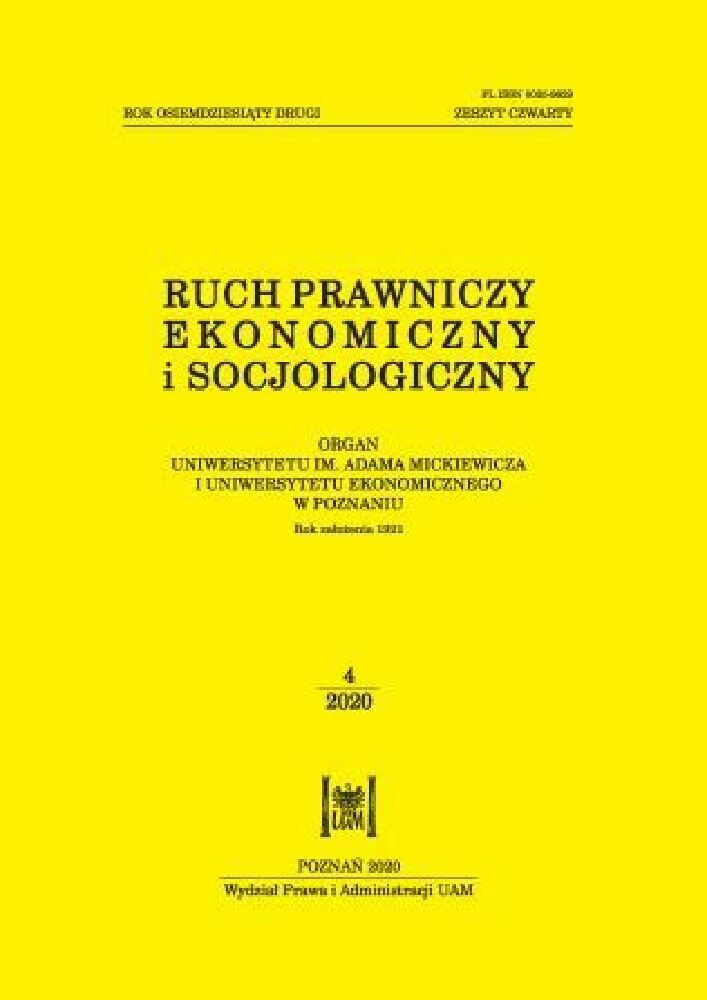Abstrakt
The paper presents the essence of financial technologies in personal financial planning, especially robo-advice. The main aim of the paper is to describe the presumptions for the development of robo-advice. An analysis of robo-advice on personal finance management was made. The analysis was based on a review of the subject literature, and on primary and secondary research. Particular attention was paid to the intensification of activities in the implementation of modern solutions and tools supporting the management of personal finances and the gradual development of robo-advisors. Modern solutions are still struggling with great distrust on the part of their current and potential customers, and the development of modern technologies in liquidity and asset management still requires a human factor.
Finansowanie
Poznan Univeristy of Economics and Businness
Bibliografia
Beketov, M., Lehmann, K., Wittke, M. (2018). Robo Advisors: quantitative methods inside the robot. Journal of Asset Management 19: 363–370.
Brenner, L., Meyll, T. (2020). Robo-Advisors: A substitute for human financial advice? Journal of Behavioral and Experimental Finance 25(March): 1–8.
Cichowicz, E. (2016). Wykorzystanie nowoczesnych technologii przez instytucje finansowe w procesie przeciwdziałania wykluczeniu finansowemu. Annales. Etyka w życiu gospodarczym. Vol. 19 No. 1: 71–82.
Deloitte (2016). Robo-Advisory in Wealth Management. [accessed 20 March 2020].
Dorfleitner, G., Hornuf, L., Schmitt, M., Weber, M. (2017). FinTech in Germany. Springer International Publishing AG: 13–54.
Facundo, A., Schmukler, S.L., Tessada, J. (2019). Robo-Advisors: Investing through Machines (English). Research & Policy Briefs; no. 21. Washington, D.C.: World Bank Group. <http://documents.worldbank.org/curated/en/275041551196836758/Robo-Advisors-Investing-through-Machines [accessed 15 March 2020].
Faloon, M., Scherer, B. (2017). Individualization of Robo-Advice. Financial Analysts Journal 47(12): 30–36. doi:10.2469/dig.v47.n12.1
Fein, M.L. (2015). Robo-Advisors: A Closer Look, June 30. <https://papers.ssrn.com/sol3/papers.cfm?abstract_id=2658701> [accessed 15 March 2020].
Fulk, M., Grable, J.E., Watkins, K., Kruger, M. (2018). Who uses robo-advisory services, and who does not? Financial Services Review 27(2): 173–188.
Górna, S., Warchlewska, A. (2018). Nowoczesne technologie jako czynnik konkurencji na lokalnych rynkach usług bankowych (na przykładzie Gospodarczego Banku Spółdzielczego Międzyrzecz. Optimum. Economicum Studies 1(91): 283–305.
ISO 22222-2005 - Personal Financial Planning. Requirements for personal financial planners
Jajuga, K., Feldman, Ł., Pietrzyk, R., Rokita, P. (2015). Integrated Risk Model in Household Life Cycle. Wrocław: Wydawnictwo Uniwersytetu Ekonomicznego we Wrocławiu.
Jung, D., Dorner, V., Glaser, F., Morana, S. (2018). Robo-Advisory: Digitalization and Automation of Financial Advisor. Business & Information Systems Engineering 60: 81–86.
Jung, D., Glaser, F., Köpplin, W. (2019). Robo-Advisory: Opportunities and Risks for the Future of Financial Advisory, [in:] V. Nissen (ed.), Advances in Consulting Research. Recent Findings and Practical Cases. Springer Nature Switzerland AG: 405–427.
Kordela, D. (2018). Robo-advisors in asset management – the experience from Germany. European Journal of Service Management 4(28/1): 151–157.
Lusardi, A., Mitchell, O.S. (2011). Financial Literacy and Retirement Planning in the United States. Netspar Discussion Paper No. 02: 1–36.
Madir, J. (ed.) (2019). FinTech: Law and Regulation. Edward Financial Law and Practice.
Madura, J. (2014). Personal finance. 5th edition. Pearson Education.
Madura, J., Casey, M., Roberts, S. (2014). Personal Financial Literacy. Pearson.
Milic-Czerniak, R. (2019). Rola fintechów w rozwoju innowacji finansowych. Studia BAS 1 (57): 37–60.
Mitek, Ł. (2016). Household Financial Planning with Financial Advisory Assistance. Współczesne Finanse. Teoria i Praktyka: 73–82.
Musiał, M. (2015). Zastosowanie instrumentów zarządzania finansami osobistymi w polskich gospodarstwach domowych. Kwartalnik Kolegium Ekonomiczno-Społecznego Studia i Prace 3, t. 4: 233-243.
Musiał, M. (2018). Efektywność gospodarowania finansami osobistymi w Polsce. Wydawnictwo Naukowe Uniwersytetu Szczecińskiego. Szczecin
Pietrzyk, R., Rokita, P. (2018). Pomiar ryzyka planu finansowego gospodarstwa domowego. Annales Universitatis Mariae Curie-Skłodowska Sectio H – Oeconomia 4(52): 59–71. doi:10.17951/h.2018.52.4.59-7
Report FinTech: Regulatory sandboxes and innovation hubs. (2018). The European Supervisory Authorities (ESAs). JC 2018 74
Samsel, A. (2019). Planowanie jako element zarządzania budżetem gospodarstw domowych. Rozprawy Ubezpieczeniowe 1: 57–68.
Swacha-Lech, M. (2016). Wiedza finansowa jako jedna z determinant długoterminowego planowania finansowego. Annales Oeconomia L, 4: 477–485. doi:10.17951/h.2016.50.4.477
Świecka, B. (2018). Kompetencje finansowe i edukacja finansowa. Ujęcie teoretyczne i praktyczne. Rozprawy Ubezpieczeniowe 1: 3–17.
Świeszczak, K. (2017). Zaufanie w świecie finansów w obliczu rozwoju technologii na przykładzie banków i sektora FinTech. Bezpieczny Bank 2: 143–158.
Waliszewski, K. (2014). Planowanie finansów osobistych (zarządzanie finansami osobistymi) z udziałem doradców finansowych – znaczenie dla gospodarstw domowych i gospodarki. Problemy Zarządzania 12(4): 204–221.
Waliszewski, K. (2016). Model doradztwa w obszarze finansów osobistych w Polsce na tle doświadczeń międzynarodowych. Poznań: Wydawnictwo Uniwersytetu Ekonomicznego w Poznaniu.
Waliszewski, K., Warchlewska, A. (2020a). Who uses Robo-Advisors? The Polish Case. European Research Studies Journal 23(Special Issue 1): 97–114. doi:10.35808/ersj/1748
Waliszewski, K., Warchlewska, A. (2020b). Socio-Demographic Factors Determining Expectation Experienced while Using Modern Technologies in Personal Financial Management (PFM and robo-advice): A Polish Case. European Research Studies Journal 23(Special Issue 2): 893–904. doi:10.35808/ersj/1904
Waliszewski, K., Warchlewska, A. (2020c). Attitudes towards artificial intelligence in the area of personal financial planning: a case study of selected countries. Entrepreneurship and Sustainability 8(2): 399–420. doi:10.9770/jesi.2020.8.2(24)
Wiśniewska, A. (2016). Determinanty nadmiernego zadłużania się polskich gospodarstw domowych. Współczesne Finanse. Teoria i Praktyka 1: 91–100.
Włodarczyk-Śpiewak, K. (2011). Nowoczesne technologie – wyzwanie dla współczesnych konsumentów. Studies & Proceeding of Polish Assiociation for Knowledge Management 51: 143–152.
Woodyard A.S., Grable J. E. (2018). Insights into the Users of Robo-Advisory Firms. Journal of Financial Service Professionals 72(5): 56–66.
www.statista.com (access 17.03.2020)
Licencja
Prawa autorskie (c) 2020 WPiA UAM

Utwór dostępny jest na licencji Creative Commons Uznanie autorstwa – Użycie niekomercyjne – Bez utworów zależnych 4.0 Międzynarodowe.





